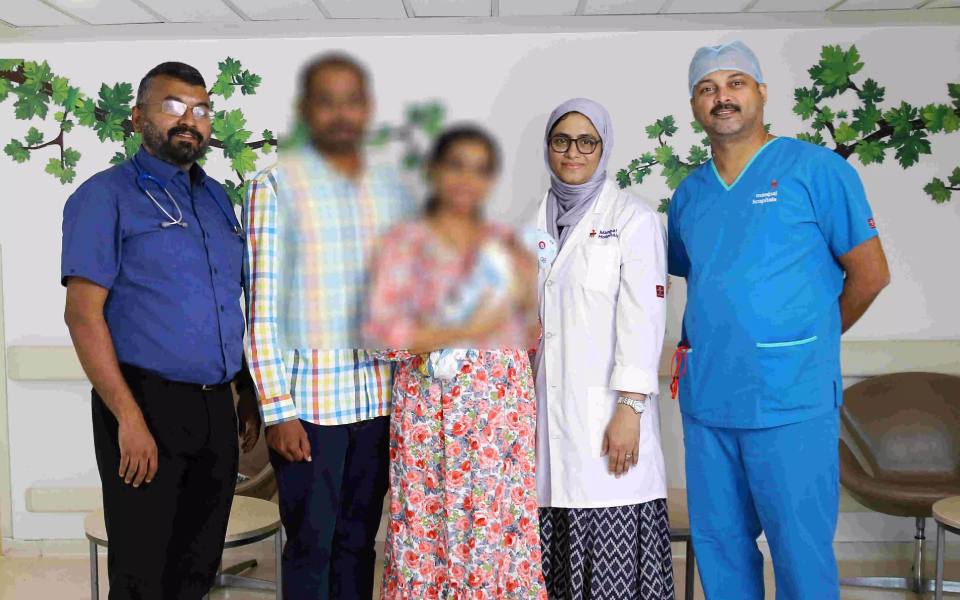Mangaluru, KARNATAKA :

Mangaluru:
In a remarkable feat of medical expertise, a team of doctors, spearheaded by Dr. Sameena Haroon, Chief Physician of the Obstetrics and Gynecology Department at KMC Hospital in Mangalore, successfully performed a challenging delivery procedure, ultimately saving the lives of both mother and child.
The delivery, which employed the innovative “Intrauterine Transfusion” system, proved critical in addressing complications arising from blood group-related issues.
The patient, a 35-year-old woman from Pune, was admitted to KMC Hospital for her third delivery due to complications stemming from blood group incompatibility. With the timely intervention and meticulous care provided by the medical team, she was safely discharged from the hospital, marking a triumph over adversity.
Blood group incompatibility between parents, particularly when one is Rh-positive and the other is Rh-negative, often leads to complications in subsequent pregnancies. These complications arise from the development of antibodies in the mother’s bloodstream during pregnancy, posing risks to both mother and fetus. Dr. Sameena Haroon emphasized the impact of such blood group disparities on maternal and fetal health.
The patient’s medical history revealed a prior normal delivery four years ago, followed by complications during her second delivery, which tragically resulted in the demise of the infant within a year due to intracranial hemorrhage. Subsequent pregnancies posed heightened risks, necessitating vigilant monitoring and specialized care.
During the current pregnancy, complications emerged at the five-month mark, prompting intensive monitoring. At 30 weeks gestation, an Indirect Coombs Test (ICT) returned positive, indicating depleted iron levels in the blood—a critical concern necessitating immediate intervention to safeguard the fetus. Premature delivery posed risks, including jaundice and intracranial bleeding, underscoring the importance of delaying delivery until the optimal timeframe.
In response to the precarious situation, the medical team executed a challenging intrauterine transfusion procedure to replenish the fetus’s hemoglobin levels, thereby mitigating the risk of preterm birth. After two subsequent weeks, delivery at 35 weeks gestation alleviated concerns surrounding low hemoglobin levels in the infant, ensuring a safe outcome for both mother and child.
Dr. Sameena added that the baby was kept under observation and monitoring in NICU for over a week post-delivery where the child received further transfusions before being discharged subsequently.
Dr. Sameena Haroon expressed gratitude for the collaborative efforts of her colleagues, including Dr. Shami Shastri, Dr. Pundalik Baliga, and Dr Mario J Bukelo, whose expertise and teamwork were instrumental in achieving a successful delivery. Despite the complexities posed by the patient’s history of fetal loss, the utilization of modern medical advancements and the dedication of the medical team culminated in a positive outcome, with both mother and child discharged from the hospital in good health.
What is intrauterine blood transfusion?
Intrauterine blood transfusion is a complex medical procedure performed during pregnancy to address severe fetal anemia. Through the procedure, the baby in mother’s womb is transfused blood.
Before the procedure, the mother undergoes thorough assessments, including ultrasound scans and blood tests. Continuous ultrasound guidance is used throughout the procedure to visualize the fetus, placenta, and the specific blood vessels involved. A thin, specialized needle is carefully inserted through the mother’s abdomen and into the amniotic sac, guided by real-time ultrasound imaging. The goal is to reach the umbilical vein of the fetus.
Once the needle is correctly positioned, compatible blood is slowly transfused into the fetus through the umbilical vein. The amount of blood transfused is carefully controlled to avoid overloading the fetal circulation.
This successful delivery at KMC Hospital in Mangalore also marks a significant milestone in medical advancement within the region. The utilization of the “Intrauterine Transfusion” system, under the adept supervision of Dr. Sameena Haroon, signifies one of the pioneering instances of this rare procedure in Mangalore. Dr. Sameena’s leadership and expertise, coupled with the collaborative efforts of her medical team, have not only facilitated a positive outcome for the patient and her child but have also expanded the scope of obstetric care in the region.
source: http://www.english.varthabharati.in / Vartha Bharati / Home> Karavali / by Vartha Bharati / March 28th, 2024








